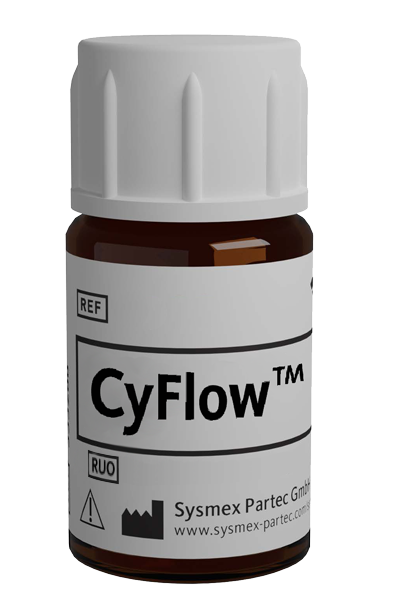CyFlow™ CD73 PE

| Alternative Name: | E5NT, Ecto'-5-nucleotidase , eN, eNT, NT5, NTE |
| Antibody: | Yes |
| Antigen: | CD73 |
| Application: | Flow cytometry |
| Clonality: | monoclonal |
| Clone: | AD2 |
| Emission Maximum: | 576 nm |
| Excitation Maximum: | 496 nm, 565 nm |
| Field of Interest: | Immunophenotyping |
| Format/Fluorochrome: | PE |
| Isotype: | IgG1 |
| Laser: | Blue , Green, Yellow |
| Regulatory Status: | RUO |
| Source Species: | Mouse |
| Target Species: | Human |
| Product number: | BY500144 |
For Research Use Only
| Quantity | 100 tests |
| Volume | 1.0 mL |
| Immunogen | Not available |
| Background Information | CD73 (ecto-5´-nucleotidase) is a 70 kDa glycoprotein anchored to the extracellular leaflet of the plasma membrane by GPI. This ecto-enzyme catalyzes dephosphorylation of AMP to adenosine. CD73 is expressed in various types of cells, such as epithelial, muscle, and endothelial cells, neutrophils, lymphocytes and fibroblasts. Inflammatory mediators support CD73 expression and its enzymatic activity, leading to the release of adenosine, which modulates inflammation through adenosine receptors. CD73 is expressed in a variety of lymphomas and leukemias, including ALL and CLL, whereas immunodeficient patients usually express low levels of this protein. |
| Usage | The reagent is designed for Flow Cytometry analysis of human blood cells. Recommended usage is 10·µl reagent·/ 100·µl of whole blood or 10^6 cells in a suspension. The content of a vial (1 ml) is sufficient for 100 tests. |
| Storage Buffer | The reagent is provided in stabilizing phosphate buffered saline (PBS) solution, pH ≈7.4, containing 0.09% (w/v) sodium azide. |
| Storage | Avoid prolonged exposure to light. Store in the dark at 2-8°C. Do not freeze. |
| Stability | Do not use after expiration date stamped on vial label. |
| Borrione P, Peola S, Mariani S, Besostri B, Mallone R, Malavasi F, Pileri A, Massaia M: CD38 stimulation lowers the activation threshold and enhances the alloreactivity of cord blood T cells by activating the phosphatidylinositol 3‑kinase pathway and inducing CD73 expression. J Immunol. 1999 May 15; 162(10):6238‑46. < PMID: 10229870 > | Nemoto E, Tada H, Shimauchi H: Disruption of CD40/CD40 ligand interaction with cleavage of CD40 on human gingival fibroblasts by human leukocyte elastase resulting in down‑regulation of chemokine production. J Leukoc Biol. 2002 Sep; 72(3):538‑45. < PMID: 12223522 > | Hashikawa T, Takedachi M, Terakura M, Saho T, Yamada S, Thompson LF, Shimabukuro Y, Murakami S: Involvement of CD73 (ecto‑5'‑nucleotidase) in adenosine generation by human gingival fibroblasts. J Dent Res. 2003 Nov; 82(11):888‑92. < PMID: 14578500 > | Rodriguez MW, Paquet AC, Yang YH, Erle DJ: Differential gene expression by integrin beta 7+ and beta 7‑ memory T helper cells. BMC Immunol. 2004 Jul 5; 5:13. < PMID: 15236665 > | Kögler G, Sensken S, Airey JA, Trapp T, Müschen M, Feldhahn N, Liedtke S, Sorg RV, Fischer J, Rosenbaum C, Greschat S, Knipper A, Bender J, Degistirici O, Gao J, Caplan AI, Colletti EJ, Almeida-Porada G, Müller HW, Zanjani E, Wernet P: A new human somatic stem cell from placental cordblood with intrinsic pluripotent differentiation potential. J Exp Med. 2004 Jul 19; 200(2):123‑35. < PMID: 15263023 > | Paquet-Fifield S, Schlüter H, Li A, Aitken T, Gangatirkar P, Blashki D, Koelmeyer R, Pouliot N, Palatsides M, Ellis S, Brouard N, Zannettino A, Saunders N, Thompson N, Li J, Kaur P: A role for pericytes as microenvironmental regulators of human skin tissue regeneration. J Clin Invest. 2009 Sep; 119(9):2795‑806. < PMID: 19652362 > | Mokry J, Soukup T, Micuda S, Karbanova J, Visek B, Brcakova E, Suchanek J, Bouchal J, Vokurkova D, Ivancakova R: Telomere attrition occurs during ex vivo expansion of human dental pulp stem cells. J Biomed Biotechnol. 2010; 2010:673513. < PMID: 20976265 > | Semenov OV, Koestenbauer S, Riegel M, Zech N, Zimmermann R, Zisch AH, Malek A: Multipotent mesenchymal stem cells from human placenta: critical parameters for isolation and maintenance of stemness after isolation. Am J Obstet Gynecol. 2010 Feb; 202(2):193. < PMID: 20035913 >
